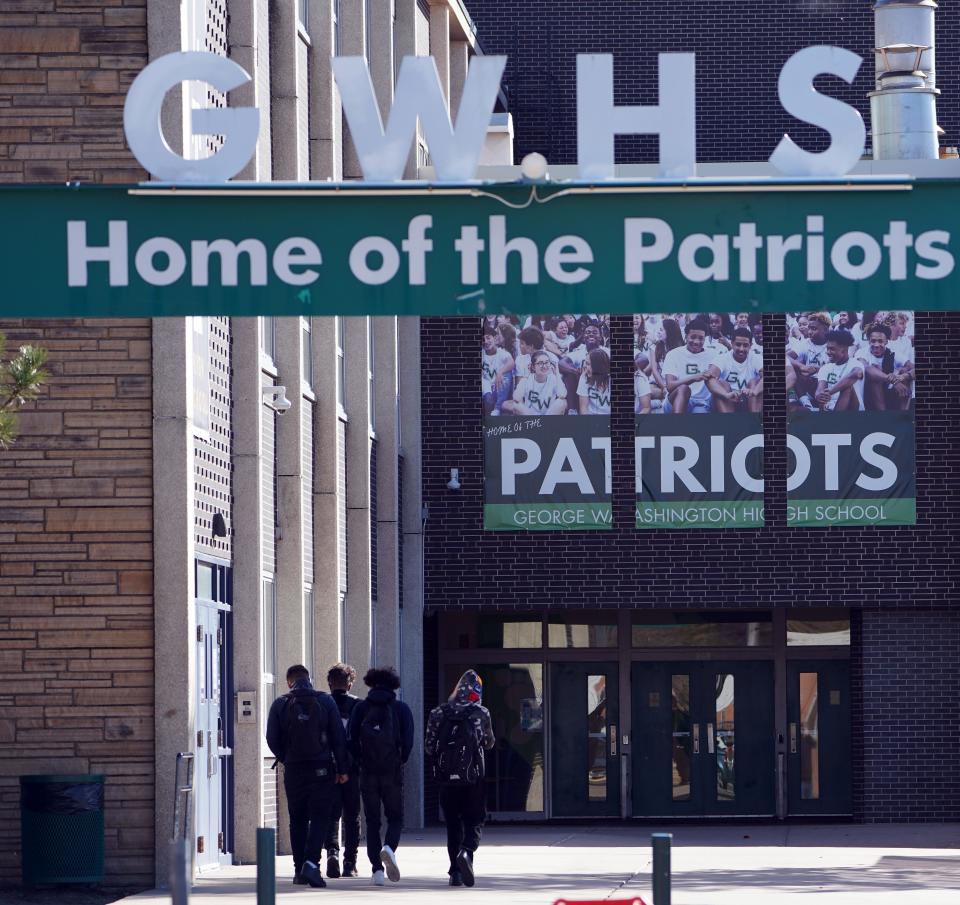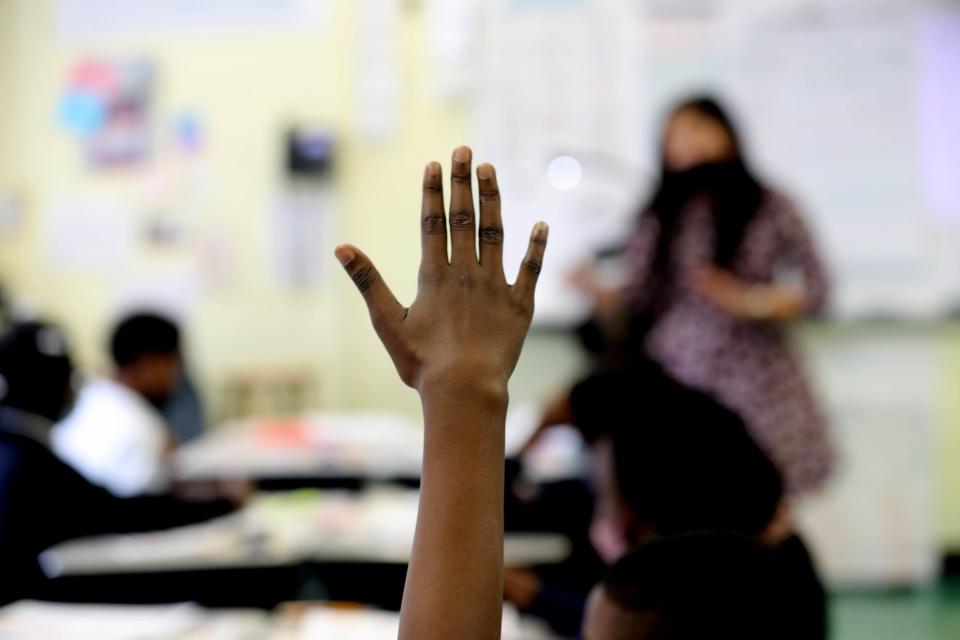'Stretched too thin': With staff 'exhausted,' schools cancel class or return to remote learning
DENVER – School districts across the nation are temporarily closing or switching back to remote learning as school administrators struggle with empty classrooms, driverless buses and understaffed cafeterias caused by widespread teacher exhaustion, coronavirus concerns and the Great Resignation.
Michigan has in recent weeks seen at least eight schools shut down or return to online learning because of staff shortages. In Florida, Brevard Public Schools said Wednesday it would extend its Thanksgiving break, while public schools in Seattle and Portland, Oregon, gave teachers and students an extra day off for Veterans Day.
Administrators acknowledge the last-minute schedule changes are forcing parents to scramble their own plans, and it's the latest obstacle for students trying to make up missed learning following widespread pandemic school closures. Experts say missing more school means some kids, particularly those from low-income families, will fall even further behind their peers.
But they also say teachers burned-out from pandemic instruction desperately need time to recharge after another tumultuous year filled with masks, testing, sickness and ongoing public-policy battles, along with trying to help students still learning how to be back in a classroom.
Related video: Teacher pumps students up with sweet daily ritual
In Bellevue, Washington, near Seattle, administrators preemptively closed schools Friday because so many teachers are taking the day off after the Veterans Day holiday, giving them a four-day weekend.
Allison Snow, a fifth-grade teacher and the local union president, said everyone is worn out.
Snow said teachers are constantly struggling to simultaneously teach new material, provide mental and emotional support to their 20,000 students, and catch up from lost days. She sees the trauma every time she walks the halls: tears, anger, impatience. Harder to see are the headaches, the anxiety, the nausea from constant pressure.
"We're trying to plow through so much that people are exhausted. And it's across the board," said Snow. "We have bled our teachers dry for so long that we shouldn't be surprised they have no more to give. And nobody wants to give up. But it's so hard to keep going when you feel set up to fail. One of the superpowers teachers usually have is patience. And people don't have that right now. All of it means it's harder for us to take care of kids."
In Boulder, Colorado, the school district is closing Friday because at least 486 teachers are taking the day off, leaving about 200 classrooms empty, said spokesman Randy Barber.
Pre-pandemic, Boulder Valley School District had a pool of about 900 qualified substitute teachers, but it entered this school year with just 300. Barber said many of those subs, who earn $100 a day, are limiting their days or asking to avoid classrooms of younger, unvaccinated kids. Without subs, the district felt it had no other option.
"We knew we would be stretching too thin and we knew it wouldn't be safe for students," he said. "Especially following the pandemic, we want our students to be in classrooms, learning as much as possible because they're trying to catch up. But there's a point at which our teachers are stretched too thin."
More: Pfizer's COVID-19 vaccine is available for kids. Will schools require it?
Barber said many subs, drivers and cafeteria workers are choosing to find work with less COVID-19 exposure and the chance for better pay. On the other side of Denver from Boulder, the Adams 12 Five Star School District also canceled classes Friday, citing a lack of substitutes, who earn $180 daily.
"There's an overwhelming sense of exhaustion," said Amie Baca-Oehlert, president of the Colorado Education Association, the statewide teacher union. "The reality is that these districts just don't feel they have any other options than canceling school for the day. This should serve as a wakeup call that we need to do better by our students and our public schools."
Denver Public Schools has switched three schools to remote learning for the rest of this week and will close all schools on Nov. 19 for a preemptive mental health day, starting Thanksgiving break early for 92,000 students.
"It is of the heaviest of decisions we make, to disrupt students' ability to come to school again," said Amber Elias, lead operational superintendent for Denver Public Schools. "We need to make sure we're not compounding those achievement gaps."

Seattle's public schools will also be closed Friday for its 53,000 students.
More than 600 teachers had requested a Friday substitute by Tuesday, and officials there said they expected absences to mount.
"The number of leave requests on a Friday after a federal holiday is indicative of the fatigue our staff and students are experiencing in these months of the return to classroom," Seattle Public Schools officials said in a statement, declining an interview request. "The four-day weekend may offer physical, mental, and emotional restoration."
Experts warned a staffing crisis was coming. This summer, the nonprofit RAND Corp. said a survey of teachers revealed 25% were considering quitting at the end of the school year, with Black or African American teachers particularly at risk.
A similar RAND study conducted in February found that stress was the most common reason given for teachers quitting, at nearly double the rate as complaints about low pay. And of those teachers who did quit, 33% of them took jobs with no health insurance or retirement benefits – a sign of how much they wanted to leave the classroom.
“Those are alarming numbers. It’s clear teachers are experiencing acute stress in their jobs," said Elizabeth Steiner, a RAND education policy expert who co-led the summer study. "It suggests that something has to give, something has to change pretty quickly."
Steiner said there's no one-size-fits-all solution and that administrators, principals and teachers need to work together in each district to address the specific local causes of stress and burnout.
Randi Weingarten, president of the American Federation of Teachers, said school workers are trapped in the tension between a society that wants to get back to normal and the lingering reality of COVID-19 deaths, supply chain disruptions and inflation. She said fights over critical race theory, transgender bathrooms and test scores are adding to the pressure.
"You don't just have the Great Resignation. You also have the Great Exhaustion," she said. "This is a year to listen to the pain and the anxiety and work together to get through it. This is a moment when people have to come together because none of us are going to get through this alone."
More: What happens when conservative school boards gain power at districts around the country
Back in Bellevue, Snow said school administrators have told teachers to essentially "do what you need to do" on Friday, hoping the four-day break will help.
She said the break is welcome – but more useful would be an honest national conversation about education funding, teacher staffing and the wide variety of roles schools are now expected to play, from providing child care and free meals to safe spaces for mental health counseling and medical care.
"There's this pressure to get school back to normal, without even paying attention to the fact that normal never worked for everyone in the first place," Snow said. "There's so many needs in a system that was never meant to do all that."

This article originally appeared on USA TODAY: Public school teachers, students demand extra days off for COVID-19

